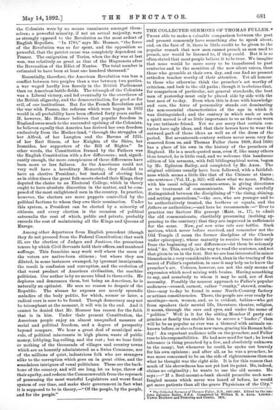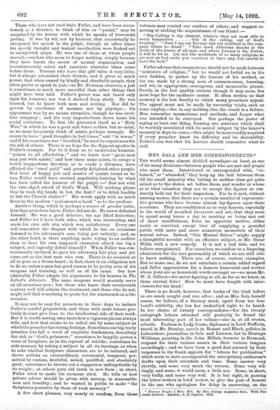THE COLLECTED SERMONS OF THOMAS FULLER.* THOSE able to make
a valuable comparison between the past and present commonly have something else to speak about, and, on the face of it, there is little credit to be given to the popular remark that now men cannot preach as men used to preach, nor would be listened to, if they could. But it is so often stated that most people believe it to be true. We imagine that none would be more sorry to be transferred to past centuries and to the monition of the now silent voices, than those who grumble at their own day, and can find no present orthodox teacher worthy of their attention. Yet all honour to those who otherwise think the preacher's art worthy of criticism, and look to the old paths ; though it is obvious that, for comparison of particular, not general standards, the best men of yesterday must only be placed side by aide with the best men of to-day. Even when this is done with knowledge and care, the force of personality stands out dominating the non-essential characteristics of the age in which it was distinguished ; and the century in which such or such a spirit moved is of as little importance to us as the coat worn by our intimate friend. Yet we are sorry that certain cen- turies have ugly ideas, and that their heroes have to wear the outward garb of those ideas as well as of the dress of the period. But seventeenth-century writers never seem very far removed from us, and Thomas Fuller (born 1608, died 1660) has a place of his own in the history of the preachers of England. He is a much-quoted man, even if, like many others thus treated, he is little read, and we welcome this handsome edition of his sermons, with full bibliographical notes, begun by Mr. Eglinton Bailey, and completed by Mr. Axon. The original editions usually have been followed, with a faithful- ness which seems a little like that of the Chinese at times : one sentence (Vol. IL, p. 325) will show what we mean. Fuller, with his usual religious common-sense, is giving directions as to treatment of communicants. He always carefully distinguished between the disciplining of "the rising, shining, and setting generations,"—the men, who are younger and to be authoritatively treated, the brethren or equals, and the fathers or authorities ;—and here he recommends :—" Ever to practice our Saviour His precept (Hatt. ix., 17), to admit the old communicants, charitably presuming (nothing ap- pearing to the contrary) that they are improved in sufficiencie for the same. Now, put new wine into new bottles. Such novices, which never before received, and remember not the Old Temple (I mean the former discipline of the Church under episcopacy), whose maturity to receive bears date only from the beginning of our differences—let them be solemnly tried," &c. This, surely, is the way to read the sentence, and not that given to us in the text. But we are less interested in minor blemishes in a very considerable work, than in the tracing of the secret of Fuller's reputation, in case it may help us to know the preacher's art. Colours, however, are not the only means of expression which need mixing with brains. Having something to say, and somebody to whom it may be said, are of first necessity. Possibly the nearest approach to Fuller's popular audiences—roused, earnest, rather "cranky," shrewd, comba- tive—may to-day be found in some North-Country factory or artisan constituencies. There, the people are ever ready for meetings—men, women, and, as is evident, babies—who get from speakers their mental life, literature, theatre, religion, it seems, through the ears and eyes, and under the name of "politics." Well is it for the sitting Member if party exi- gencies or family ties enable him to secure a " leader ;" then will he be as popular as ever was a General with animals un- known before, or slaves from new races, gracing his Roman holi- day! An expectant audience tells on the preacher, and Fuller rose to his responsibilities. He had sore need for tact; he loved tolerance (a thing preached by a few, and absolutely unknown to the many). but whenever he could, he spoke out bravely for his own opinions ; and after all, as he was a preacher, he was more concerned to be on the side of righteousness than on what he thought was the right side. It is for this reason that much Of his shrewdness has not yet lost its point. He, indeed, claims no originality ; he wants to use the old means. He says :—" If a Soul-mount-a-bank should prescribe such new- fangled means which never was heard of before, he would get more patients than all the grave Physicians of the City."
• The Collected Sermons of Thomas Fuller, D.D., 1831-1889. Edited by the lato John Eglinton Bailey, F.8.A. Completed by William E. A. Axon.. London : Unwin Brotheas and Pickering and Chatto. 1831.
Those who have not read their Faller, and have been accus- tomed, at a distance, to think of him as "quaint," may be surprised by the horror with which he speaks of irreverent jesting. It was by wit, not by humour, that occasionally he sharpened his speech in the pulpit, though at other times his speedy thought and instant recollection were flashed out in unexpected quips. He was one of those at whom people marvel,—readers who seem to forget nothing, simply because they have learnt the secret of mental organisation, and instantaneously select and associate whatever ideas come before them. Persons who have this gift value it very little, but it always astonishes their friends, and it gives so much power, that when owned by kindly and charitable people, they often prefer to speak in jest,--as Dr. Newman observes, a jest is sometimes so much more merciful than other things that might have been said. Fuller's power was not based only upon his humour; nor was it derived from study. He was learned, but he knew both men and writing. Nor did he govern by excellence of manner, nor by physique ; his appearance was by no means attractive, though he was excel- lent company ; and his very imperfections drove home his social criticisms. To him life presented itself as a "Holy War," in which he was a good and brave soldier, but no saint, as we most frequently think of saints, perhaps wrongly. He strove to have good thoughts in bad times," and "in worse," and if his conscience was "troubled," he used its experiences for the aid of others. There is no hope for the flippant speaker in Fuller's example. Far be it from us to undervalue humour, "poison to all affectation ;" and we know how "great men may jest with saints," and how these same saints, to escape a bore's inopportune devotion, or to evade a dilemma, have afflicted the " unco' guid " and greatly delighted other people. But lover of happy jest and master of quaint terms as he was, Fuller would have scorned popularity-hunting by what has been called the humour of the pulpit :—" Jest not with the two-edged sword of God's Word. Will nothing please thee to wash thy hands in but the font ? or to drink healths in but the Church chalice ?" His words apply with as much force to the modern " soul-mount-a-bank " as to the profane.
Another thing, which is perhaps a source of greater irrita- tion than preachers know, Fuller did not do. He never defeated himself. He was a good debater ; the age liked dialectics ; and Fuller let it have both sides, which was interesting, and made his own side win, which was satisfactory. Every one will remember the disgust with which he has on occasions listened to his adversary's case being put unfairly; and, on the other hand, is there anything more trying to an auditor than to hear his own supposed champion attack too big a subject, and logically defeat himself ? When Fuller was con- troversially inclined, he gave his adversary fair play, and yet came out as the best man who won. There is no occasion at all to pose as a Great-heart ; in fact, there is an obligation not
to do so, unless a man has good reason to be pretty sure of his weapons and training, as well as of his cause. See how admirably Fuller adapts his arguments to his hearers in The Infant's Advocate. The same weapons would scarcely serve on all occasions now ; but those who know their seventeenth
century well will admire the treatment, and those who do not, might still find something to quote for the nineteenth on a like occasion.
It may not be easy for preachers in these days to imitate Fuller's careful preparation, and those with most leisure pro- bably do least give time to the intellectual side of their work.
But it is worth noting once more how a vigorous phrase always tells, and how that seems to be called out by some subject on which the preacher has strong feelings. Sometimes our big, burly preacher lets fall a word of exquisite tenderness, describing the sick as "God's prisoners ;" sometimes he happily quotes a verse of Scripture, as in his reproof of suicide; sometimes he aids memory by taking a subject in all its bearings, as when he asks whether Scripture characters are to be imitated, and shows actions as extraordinary, ceremonial, temporal, per- mitted by custom, doubtful, mixed, qualified, and absolutely good; sometimes he throws out a suggestion unforgettable by its weight ; at others puts old truth in new form : in short,
Fuller tried to make his sermons stick. He tells us how private advice should be given, with secrecy, in seasonable- ness and humility ; and he wanted in public to make "the Scriptures portative by those of weak memory."
A few short phrases, very nearly at random, from these
volumes may remind our readers of others, and suggest re- newing or making the acquaintance of our friend :— " Thy Calling is thy element, wherein thou art most able to
resist temptation Out of thy calling, out of God's keeping." "Sure I am our Saviour was not indebted to the com- pany where he dined." "Take heed. Atheism knocks at the doore of the hearts of all men, and where Luxury is the Porter, it will be let in. Let not the multitude of so many religions as are now on foot make you carelesse to have any, but careful to have the best."
Fuller advises that comparisons should not be made between "ministers of religion ;" but he would not forbid us, in his own fashion, to gather up the lessons of his method, as the use made by a strong man of common-sense, learning, and wit, in appropriate, courageous, and memorable phrase. Surely, in the last quality, curious though it may seem, lies most hope for the mediocre orator. It often strikes us that memory is the last faculty to which many preachers appeal. The appeal must not be made by unworthy tricks, such as some employ,—for, to say nothing else, the result is a failure. Men remember mannerisms and methods, and forget what was intended to be conveyed. But perhaps the power of saying at least one thing, framing one sentence which shall be worthily associated with its sacred subject by the hearer's memory in days to come,—this might be more readily acquired if every preacher knew its difficulty and its desirability. Fuller's aim was that his hearers should remember what he said.







































 Previous page
Previous page